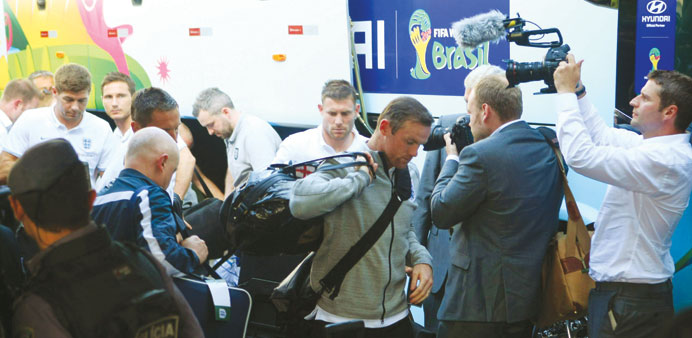|
English residents in Manaus have told their Brazilian neighbours not to fret over the expected invasion of hordes of England football fans despite their worldwide reputation for wild partying. |
England’s most energetic fans have something of a bad reputation throughout most of the world due in particular to a sorry history of football hooliganism.
That was largely confined to club football in the 1970s and 80s but even at the 1998 World Cup there was tension between England hooligans and local youths of north African origin in the French port of Marseille.
But Englishman Chris Westwood, who lives in Manaus, says people shouldn’t judge a book by its cover.
“I think there’s a popular misconception that England fans just sit and drink and sing songs,” he said.
“These guys that come to World Cups have been to South Africa, they’ve been to Japan, Germany, some of the older ones might have even been to the (United) States back in the day, so they are quite well travelled and do like to go and see things.
“They don’t like to just sit and watch football, they like to get to know the city.”
Not everyone is so sure the average English fan is cultured enough to visit the local area which was the Amazon centre of the country’s 19th century rubber boom.
So far only a few hundred fans have made it to Manaus and they’ve been keeping a low profile, sunning themselves, seeking shelter from the heat and humidity with a beer or going for a cruise down the Amazon river.
“I fear for what’s going to happen when the mass of English fans descend upon here, the city centre, because there isn’t a mass of bars,” said Phd student Chris Brown, who also lives in Manaus.
“I am not entirely convinced that the bars that are here are prepared for what’s about to hit them, especially if England lose on Saturday.”
Even if England fans are well behaved, they have some making up to do in the local area to restore the country’s battered reputation, says Adrian Bernett, a British rainforest ecologist at INPA in Manaus.
“Unfortunately, the thing that the Brits are remembered for is a chap called (Henry) Wickham who legally, with permits, boated out of here with thousands of rubber seeds, (germinated them) and then went to Malaysia and it ended the Brazilian monopoly on rubber.
“So basically, the Brits, not only did they build the place largely, they are also responsible for destroying it and that’s what people remember.”
If the local residents don’t get their own back on the Brits, then maybe the wildlife will, according to Martin Pollard, an England fan who lives in China.
“When I was in the jungle on Wednesday and it was hot, and there were lots of creepy crawlies, and I suppose if you’re not careful, you might get bitten or eaten by something not very nice,” he said.
The flames of discord between the English and the locals were fanned after a row broke out when English manager Roy Hodgson said the heat and humidity of Manaus would be problematic for his team.
That brought a rebuke from the local mayor Arthur Virgilio, who said the England manager and his team were not welcome in his city.
But not all Manaus residents are planning a hostile reception for the English.
“We will receive them and show them that Manaus is not what they said it was: heat, humidity. We will welcome them with open arms,” said Alfredo Prado, who is responsible for the Rua da Copa street decoration project in Manaus.
Perhaps the worst thing that could afflict the heavy-drinking English in this hot and humid corner of the Amazon is dehydration.
But Westwood says the remedy can be found in a fruit which is in abundance in Manaus—coconuts.
“I should let them know that this is great rehydration, it cures a hangover brilliantly,” he said of coconut milk.

